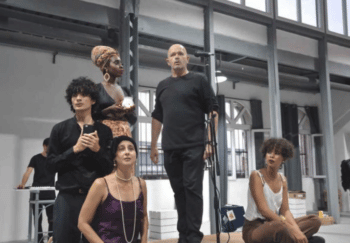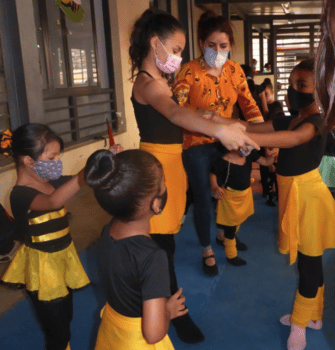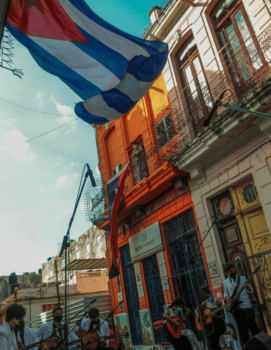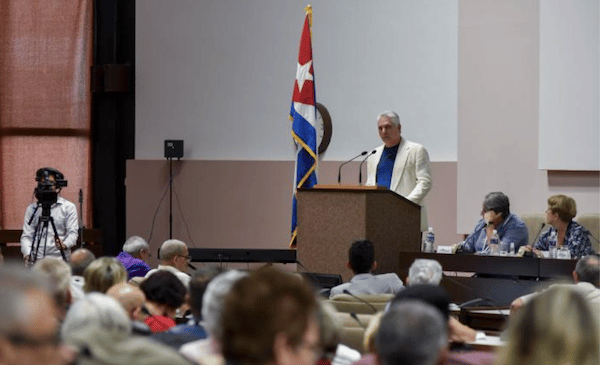Speech by the First Secretary of the Central Committee of the Communist Party of Cuba and President of the Republic, Miguel Díaz-Canel Bermúdez, at the closing of the 2nd National Council of the Uneac, Havana Convention Center, July 8, 2022, “Year 64 of the Revolution”
Verbatim Versions – Presidency of the Republic)
Dear friends,
We come to this National Council three years after the Congress and two of them in pandemic, without pause in the follow-up to the agreements of that long, deep and critical meeting that opened the way to some solutions and a thousand more challenges.
I have been studying the documents, which are extensive but essential, and, undoubtedly, you have worked and the Congress has been updated. Not all the problems have been solved, but good pieces have been taken out of them.
It is to be appreciated, even if you yourselves are not aware of what you are doing: this Council has become a declaration of principles, of revolutionary principles.
The country is grateful to its artists and intellectuals for the contribution they have made from the commissions to follow up most of the agreements and proposals of the Ninth Congress. The ten commissions have results to show, and some of them have been contributing for more than 20 years in transcendental matters for the nation, such as the integral formation of our citizens or the contribution of art to society.
I am speaking, of course, of the Education, Culture and Society Commission, whose first mission was designed with the contribution of intellectuals of the stature of Retamar, Graziella, Helmo and others. I highlight the contribution of this Commission for its scope, impact and years of work, but the ten commissions deserve recognition.
The Council, its debates, the quality of the discussions and proposals confirm that the Congress did not end when its sessions ended in June 2019, something that I already knew because it did not end even for me, that month after month, wherever the sun rises, I receive artists, writers and teachers in our work headquarters to continue on the agreements, giving systematic follow-up in what have become meeting spaces between the Cuban intelligentsia and the leadership of the Party and the Government in the country.
The two years and a little more that the pandemic lasted have been more productive than could have been expected. And we owe that, without a doubt, to the engines that the Congress ignited and to the unquestionable jolt caused in any patriot by the direct clash with the plans of subversion that aim first, and with particular viciousness, at the soul of the homeland, which is you and your works.
Never as now has Fidel’s reasoning become so clear when he said that culture is the first thing to be saved.

The work of creators and artists has a direct impact on the spiritual fabric of the nation. (Photo: Maité Fernández)
COVID-19 did not stop UNEAC, it did not stop the artists and intellectuals, whose drive was decisive in restoring the spirits of a society hit by two pandemics: COVID-19 and the blockade, but the blockade intensified. All this in spite of the fact that it has also been a guild hard hit by the loss of valuable colleagues, of creators who only two years ago shared the sessions of the Ninth Congress with us.
I believe that one of the merits of this Council is to have provoked a debate on the challenges UNEAC and its membership faces in the face of the colonizing wave that threatens to invade all cultural spaces through the most sophisticated and diverse channels.
I want to focus on this issue, because I would say that it is central to any of the tasks that UNEAC’s membership has proposed, even before the organization was born, since the days of Palabras a los intelectuales. That is why it was so important that the plenary debates pointed in that direction.
It is hard to talk to you about a subject on which we have worked thanks to you; in particular, I am grateful for the devotion for these matters that Victor Fowler, Helmo, Graziella, Torres Cuevas, Limia, Israel, Jose Ernesto, Elier, Javier and Abel, among others, always transmit to us every month.
A proud truth has been with us since 1868: our artistic and cultural vanguard is distinguished for having always fought a long and deep battle against cultural colonization, but no one is in a position to affirm that there is an absolute understanding of the seriousness of the phenomenon on the part of those who carry out some kind of work linked to culture.
The historical selectivity of UNEAC has been a purifying filter of rejection to uncritical, banal and impoverishing cultural consumption; but closing the doors is not enough, it is necessary to create, show, make viral, as they say now, the genuine and powerful Cuban culture and also universal, in all areas, to win the fight against mediocrity. I say universal because I believe in the value of culture in its broadest sense. “Let the world become part of our republics; but the trunk must be that of our republics,” wrote José Martí.
Universality and identity are inseparable in Cuban culture, one nurtures the other and both contribute to the conformation of the originality that distinguishes us. That originality is a key piece in the history of the peoples, it is the basis of our resistance. That is why the empire gives so much importance to the cultural war, that is why the siege, the harassment, the permanent interest in buying artists, intellectuals, sportsmen, doctors, scientists, in short, personalities with social recognition. To this end, they make use of a powerful ideological reproduction apparatus with large conglomerates of media, material and financial resources, which constantly bombard ideas, values and ways of being.
Faced with this enormous deployment of resources in order to win the minds and hearts of young people in particular and of the people in general, our resources and production capacities that would allow us to replace a good part of these products made for uncritical enchantment, are today very limited and in some cases non-existent.

The cultural consumption of the new generations must be intelligently attended to. (Photo: Granma Archive)
What to do then in the face of this painful but undeniable certainty? In the first place, it will always be necessary to appeal to one of the fundamental weapons in Fidel’s political arsenal: to educate the people, to foster a critical conscience, a critical thinking that guarantees an educated discernment of what is worthy and what is not. We have to form that conscience, but also induce it, bearing in mind that the media and the public are no longer the same. In this sense, we need to give greater impetus to audiovisual education and culture in the digital space.
You, like almost no other professional group, have the capacity and the possibility of stimulating, from knowledge and artistic sensitivity, the development of a culture of debate from an early school age through highly creative extracurricular activities, contests, digital publications, opinion meetings, cultural festivals at school, tribute to great figures, among others.
We have, and it is a great strength, our institutional organization, which is well established and consolidated in different work systems: a national media system, an education system, a national system of cultural institutions, a system of publications and sites in the digital space.
If we achieve the articulation of these systems for the coordinated dissemination of ideas, concepts and tools, the material deficiencies will weigh less, but our ideological or communicational responses, which transit through these systems, have to stop being formal and bureaucratized.
We have to eliminate the triumphalist or empty rhetoric that often ends up distancing us from all audiences, causing the people or certain segments to distrust and distance themselves from our institutions and our discourses.
We need an absolutely creative offensive in the face of imperial aggressiveness, and the use we make of new technologies for digital communication, podcasts, YouTube videos, blogs, chat forums, discussion groups in social networks, or web series is still very poor.
We need more options that invite and offer spaces for expression and enjoyment to the young people of today and the future.

The Program of integral attention to our neighborhoods is, at the same time, a process of cultural growth. (Photo: José Manuel Correa)
There is a design and a work program for cultural decolonization that we have been discussing from the Presidency and the leadership of the Party with many of you. It is broad, comprehensive, ambitious, but it is necessary to spread it, it is imperative to make the leap, to generate contents at the height of the potentialities of our culture.
In recent years and, in my opinion, with the very thrust of the debates we have held monthly, reviewing ideas, projects, achievements, potentialities, audiovisual and dramatized production has taken breath again; television, film and theater have confirmed how much our own works can penetrate and what beautiful feelings they awaken in the sensitive souls of Cubans. Suffice it to mention the series Lucha contra bandidos, Duaba, Entrega, Calendario, the documentary Soberanía, the productions of Nave Oficio de Isla, and Luz, the films El Mayor and Inocencia, and the documentary Volverán los abrazos, as important works of Cuban production.
And forgive the incomplete account, but this is the proof that under the worst attacks and the greatest shortages, with culture as the sword and shield of the Cuban nation, Cuba lives and promotes the best human values (Applause).
It is these results that inspire and drive new projects and impacts on audiences as the guide for others waiting for their chance; the more we see, the more are already emerging.
Also the spaces-meetings such as Miradas de mujer, attending to our feminist successes, and events of literature, traditions, humor, like the one that just concluded; the takeoff of the commercialization of music that is still below its potential but shows an unstoppable development, dance or ballet, are telling us from the daily news in our media that, despite the blows and above them, Cuba is culture (Applause).
These challenging years will remain in the popular memory not only for the supreme creation of scientists, but also for the inseparable sounds of triumphs. Buena Fe, Arnaldo, Fabré, Raúl Torres -again I apologize for the always incomplete list-, the same exalting the brave of the red zone and the creators of vaccines that respond directly to the attacks of the toxic media against Cuba, consecrated the resistance from the music and from the networks.
Those sounds associated with a heroic time are exciting, as it is proud to see the enormous Silvio filling squares in Mexico or Madrid, where El Necio was energetically listened to, and also in our neighborhoods.
Today it is essential to elevate that enormous work, impossible to summarize in one speech, to the traditional media and, above all, to the social networks, considering the artistic hierarchies without censorship of nature, alien to creation and promoting the best, what most distinguishes us and contributes to us. We must combine good art with good practices in the use of all platforms.
We must pay intelligent attention to the cultural consumption of the new generations, avoiding the exclusion, out of prejudice, of what they sometimes consume uncritically. We must listen, debate and move the formation of other consumptions through real dialogue and participation that ensures greater social integration.
The Program of integral attention to our neighborhoods is, at the same time, a process of cultural growth in the ways of living together, of socializing that is strengthened in the rescue of essences and traditions. I reiterate that it is not a matter of invading the neighborhood or intervening in it, it is a matter of accompanying growth without traumas and without traps, and I am glad to know that we have counted on you for the program to improve life in the neighborhoods.
UNEAC has been a pioneer in difficult times like these. The work of cultural promoters and artists in their neighborhoods, the projects that became paradigms such as Villafaña’s, Alden Knight’s, and the Palomas Project, for their extension to all areas of life in the community and the expression of that life in audiovisuals that are, at the same time, inquiry and testimony of a crucial time, opened paths along which today our efforts to conquer all possible social justice are moving.
And if proof were lacking, the period of the pandemic arrived to provide it: the positive response to the demand for artistic work in the communities, in the vaccination centers, in UNEAC headquarters and in projects such as Kcho’s in Romerillo, the cinema, television, radio, artistic brigades in hospitals and isolation centers in all the provinces. Everything was less hard because of that and remained in the memory of the Cuban soul, thanks to the work of Cuban creators (Applause).
That militancy with life, not on the side of the people but within them, has put Cuban culture under the fire of the media war that is being waged against Cuba, with the empire believing its own lie that the Revolution is living its final days. They know, of course, the direct impact of creators and artists on the spiritual fabric of the nation, that’s why they go all out against culture.
Harassed, attacked in the networks and on the stages, with the same viciousness that is pursued in the economy and finances of the country, our most valuable intellectuals and artists have responded with serenity, courage and professionalism to the worst attacks. They have not allowed themselves to be dragged down by the spiral of ignorance and hatred of adversaries without morals, without ethics and without work.
Just to cite an example: when, in the name of culture, a boycott was organized against the Havana Biennial, a historic event of the visual arts, and the freedom of creation was appealed to in order to stain the symbols of the homeland and disrespect the new Constitution as a first step to the perverse goal of dismantling the profound emancipatory process of 63 years of the Revolution, you did not give up, you did not “throw the couch” and the Biennial triumphed over hatred (Applause).
You -and when I say you, I’m talking about all the creators recognized by UNEAC, which you represent- have been tireless artisans of the alternative, defending spaces and works of national heritage and new creations, as proof of your vitality. That is also creative resistance!
And they have also been powerful shields against hatred, reminding us of that tremendous phrase of Martí in Our America: “A vital idea brandished before the world at the right moment like the mystic banner of Judgment Day can stop a fleet of battleships.”
I see no other way of being and acting when one comes from a tradition of greats like its founders, especially Nicolás Guillén, first president of UNEAC, a very personal and universal voice whose 120th birthday we celebrate with these sessions.
Every meeting with intellectuals and artists, be it this plenary session or our monthly check-up meetings, nourishes our senses and fills us with enthusiasm to undertake new projects.
We increasingly feel part of you, always sure that the present and the future must be socialist. Socialism saved us from the pandemic, socialism defeated the attempted vandalism coup, and what we are really going to celebrate as a first anniversary of July 11 is that the Cuban people and the Cuban Revolution dismantled a vandalism coup d’état (Applause).
I am convinced that by defending socialism we will overcome the current harsh situation and defeat imperialist hatred.
Finally, may an energetic sun always dawn in our veins! Finally, here we are!
Thank you very much (prolonged applause).

